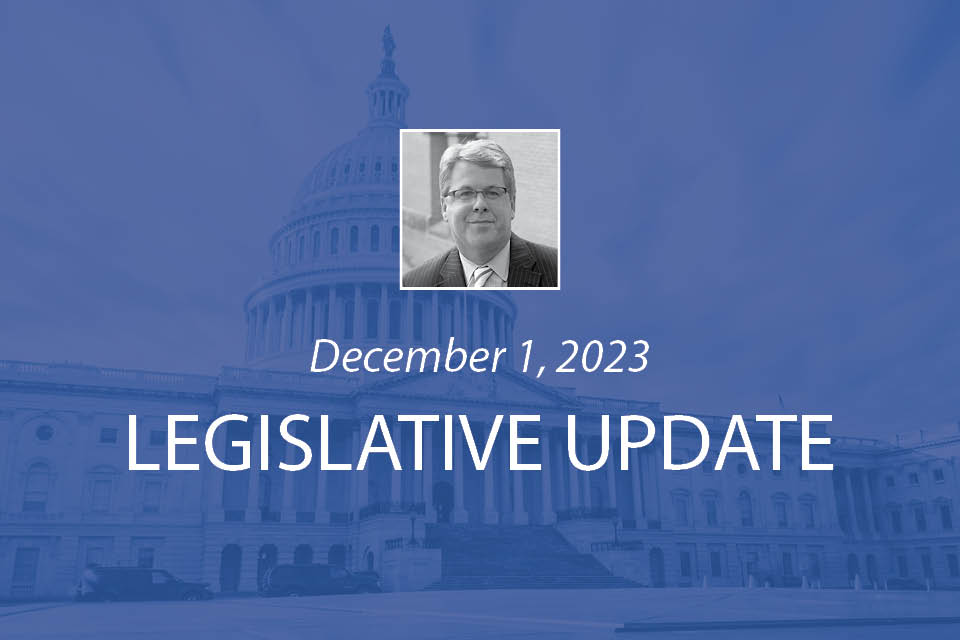Tax Updates
This week, a letter led by Rep. Rudy Yakym (R-IN) and signed by over 150 House Republicans was sent to House Speaker Mike Johnson (R-LA) to urge action by the end of this year on the expired and expiring business tax benefits that were authorized by the Tax Cuts and Jobs Act of 2017. None of the signatories sits on the House Ways & Means Committee and that was by design. Rep. Yakym wanted to show leadership that there is strong support across the Republican Caucus for action by year’s end on these key tax benefits.
These benefits are:
- Full expensing (100 percent depreciation) of the cost of machinery and equipment in the year in which the costs are incurred.
- Benefit began to ratchet down this year by 20 percent.
- Will decrease 20 percent each year until fully phased out in 2027.
- R&D Tax Credit which allows costs of research and development to be written off the year in which they are incurred.
- Lapsed in 2022. R&D costs now have to be amortized over 5 years, making investments in the business more costly and restricting cash flow.
- U.S. is now one of only two developed countries requiring amortization of these costs.
- Restoring EBITDA as the standard for deducting interest expenses.
- Prior to 2022, business interest expense deductions were limited to 30 percent of Earnings Before Interest, Tax, Depreciation and Amortization (EBITDA). Now they are limited to 30 percent of EBIT—a stricter standard that serves as a tax on investment by making it more expensive for capital intensive industries throughout the supply chain to finance job creating growth.
A package of legislation was reported by the House Ways & Means Committee earlier this year but has not received a floor vote. Those bills are–H.R. 2673, the American Innovation and R&D Competitiveness Act and S. 866, the American Innovation and Jobs Act, which would permanently repeal the R&D amortization provision; H.R. 2788 and S. 1232, the American Investment in Manufacturing Act, which would permanently restore the pro-growth EBITDA interest limitation standard; and H.R. 2406 and S. 1117, the Accelerate Long-Term Investment Growth Now Act, which would permanently extend full expensing.
While Speaker Johnson supports the tax package, the complicating factor is lack of a legislative vehicle. This is an unusual year in that there is no pre-Christmas “fiscal cliff” driving action on a budget deal where tax policy would usually ride. Every year for the last decade, Congress has been at work right up to Christmas week hammering out a budget deal. This year Congress funded the government into early 2024. The only vehicles left on which to legislate this year are the National Defense Authorization Act and legislation extending funding for the Federal Aviation Administration, which runs out December 31. ABMA will keep the pressure on Members of Congress on and off the tax writing committees to urge action on our tax priorities before the end of the year.
Workforce Development
Earlier this month, co-chairs of the House Career and Technical Education Caucus—Representatives Glenn Thompson (R-PA) and Suzanne Bonamici (D-OR)—introduced a resolution (H.Res. 873) designating November as “National Career Development Month.” In the lengthy “whereas” section of the resolution, the measure notes that career development assistance is a community partnership effort involving the education system, the home and family structure, business, industry, and a wide variety of community agencies and organizations and is not carried out by career development professionals alone. It further notes that, as of September 2023, there are 6.5 million workers that are unemployed at the same time that employers across the country and in almost every sector struggle to find employees. The resolution may be found here.




